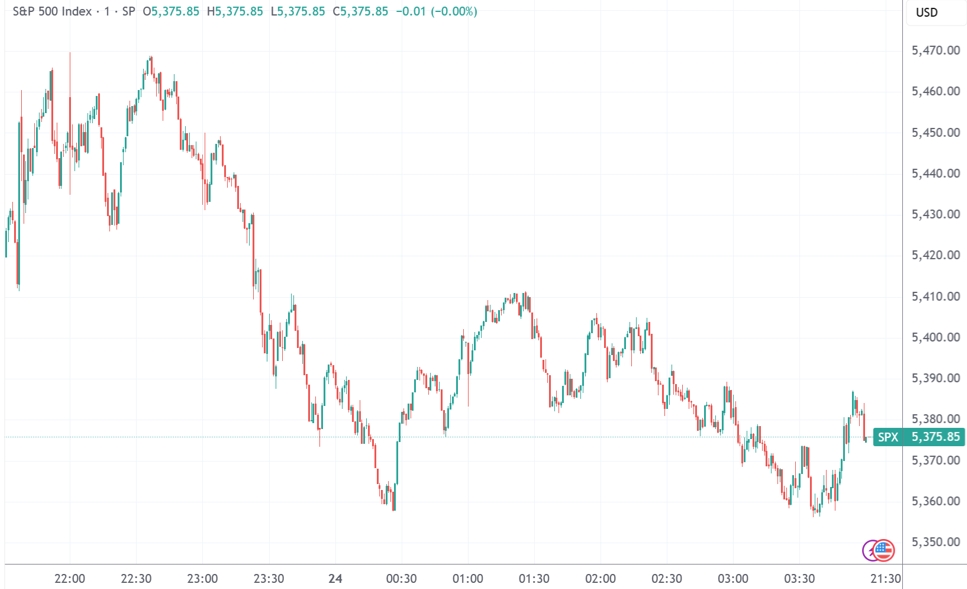Despite lingering doubts about the sustainability of Trump's policies, the US stock market still managed to close higher on Wednesday after initially jumping and then pulling back. Earlier, both Trump and Treasury Secretary Besant made statements easing tariff policies, while Trump also emphasized that he had no intention of firing Fed Chairman Powell.
At the close, the S&P 500 rose 1.67% to 5,375.86, the Nasdaq Composite gained 2.5% to 16,708.05, and the Dow Jones Industrial Average increased 1.07% to 39,606.57.
It is worth noting that the S&P 500's intraday gain peaked at over 3%, and the Nasdaq's gain also exceeded 4% at its highest point, before both indices pulled back during the session. This also reflects investors' continued high level of distrust in Trump. Meanwhile, the S&P 500's range of 5,400-5,500 points is seen by many analysts as the upper limit of the wait-and-see range before Trump's policies become clear.

(S&P 500 Index Intraday Chart, Source: TradingView)
Dario Perkins, an economist at macro research firm TS Lombard, interpreted that the market would welcome Trump's (reluctant) vote of confidence, but the damage he has done to the Fed's independence is already evident. Trump wants an interest rate cut, but his malicious attacks on Powell have made it more difficult for the Fed to act.
The bearish sentiment on US assets continues. UBS Group, in a report released on Wednesday, downgraded its outlook for the US dollar just one month later, expecting the euro to rise to 1.23 against the US dollar by the end of the year, compared to around 1.13 on Wednesday; it also predicted that the US dollar would fall from 143 to 130 against the yen.
Shahab Jalinoos, head of G10 FX strategy at UBS, pointed out that the market's focus is now strongly concentrated on the damage the US itself will suffer from aggressive tariffs, even more than the impact on US export countries. Therefore, the US dollar has now shifted from a safe-haven asset to a risk-on currency.
Facing the unpredictable Trump administration, Wall Street has also found a new trick to trade US stocks—watching which Trump cabinet member is being given more attention. Neil Dutta, head of US economics at Renaissance Macro Research, pointed out on Tuesday that since early March, on days when Commerce Secretary Lutnick and trade advisor Navarro made headlines, the S&P 500 has cumulatively fallen by 719 points. In contrast, if Besant was the focus of the day's news, the S&P 500 has cumulatively risen by 52 points (including Wednesday's gain, it should now be 140 points).
After the market close, the White House also confirmed earlier media reports that the Trump administration is considering granting partial tariff exemptions to automakers. However, this statement quickly faced conflict, as Trump himself stated in his office around 6:00 AM Beijing time on Thursday that he might impose higher tariffs on Canadian cars, while denying any adjustments to tariffs on cars and parts.

Hot Stock Performance
Tech giants collectively rose, with Apple up 2.43%, Microsoft up 2.06%, Amazon up 4.28%, Nvidia up 3.86%, Google-A up 2.56%, Tesla up 5.37%, Meta up 4%, and AMD up 4.79%.
Chinese stocks also performed well on Wednesday, with the Nasdaq Golden Dragon China Index closing up 2.93%. Alibaba rose 2.67%, JD.com fell 0.33%, Baidu rose 2.88%, Pinduoduo rose 2.13%, Bilibili rose 3.23%, NIO rose 4.8%, NetEase rose 1.61%, Futu Holdings rose 3.45%, XPeng Motors rose 7.34%, EHang rose 4.51%, Kingsoft Cloud rose 7.18%, and Tuya Smart rose 9.55%.
Company News
[After-Hours Earnings Snapshot]
IBM
Q1 revenue of $14.54 billion and adjusted EPS of $1.6 both beat expectations. The company expects Q2 revenue to be between $16.4 billion and $16.75 billion, higher than the consensus estimate. However, it seems that the earnings themselves were not enough to fully offset the impact of order losses due to the US government's cost-cutting measures and tariff shocks, as IBM fell over 5% after hours at the time of writing. Texas Instruments
Q1 revenue grew 11% to $4.07 billion, with EPS reaching $1.28, both beating expectations. The company expects Q2 revenue to be between $4.17 billion and $4.53 billion, compared to the Wall Street average estimate of $4.12 billion. At the time of writing, Texas Instruments rose over 5% after hours. Semiconductor equipment supplier
Lam Research reported quarterly revenue of $4.72 billion and expects current quarter revenue of $5 billion, both beating expectations. At the time of writing, Lam Research rose over 3% after hours. Chain restaurant company
Chipotle Mexican Grill reported revenue of $2.88 billion, with same-store sales down 0.4% QoQ, the first such decline since 2020. The company also lowered its earnings outlook due to slowing consumer spending. At the time of writing, the company fell over 2% after hours. [EU Cracks Down on US Tech Giants, Apple and Meta Fined €700 Million]
On Wednesday local time, the EU announced its first fines under the Digital Markets Act, with Apple fined €500 million and Meta fined €200 million. The European Commission stated that Apple violated regulations by not allowing app developers to guide users to purchase products outside its App Store. Meta's business model of offering "ad-free services" on Instagram and Facebook also violated the DMA.
[Meta Launches Real-Time Translation for All AI Glasses Users]
Tech giant Meta announced on Wednesday a series of new AI features for its Ray-Ban smart glasses, with the translation feature now available to all users, supporting multilingual conversations in English, French, Italian, and Spanish. If users download the language pack in advance, they can also use this service offline.
[Eli Lilly Cracks Down on Proliferation of Generic Weight-Loss Drugs, Sues 4 Online Medical Platforms]
US pharmaceutical giant Eli Lilly is suing four telemedicine companies for selling generic versions of its weight-loss drug Zepbound and diabetes treatment Mounjaro. Eli Lilly claims that these companies falsely claimed to offer personalized treatment plans, but were actually mass-selling slightly modified versions of Lilly's drugs to circumvent FDA regulations.